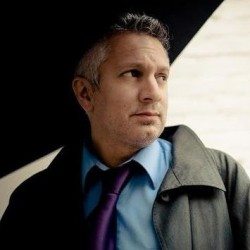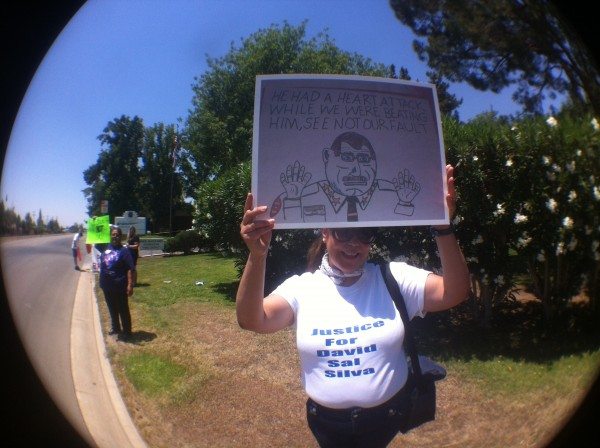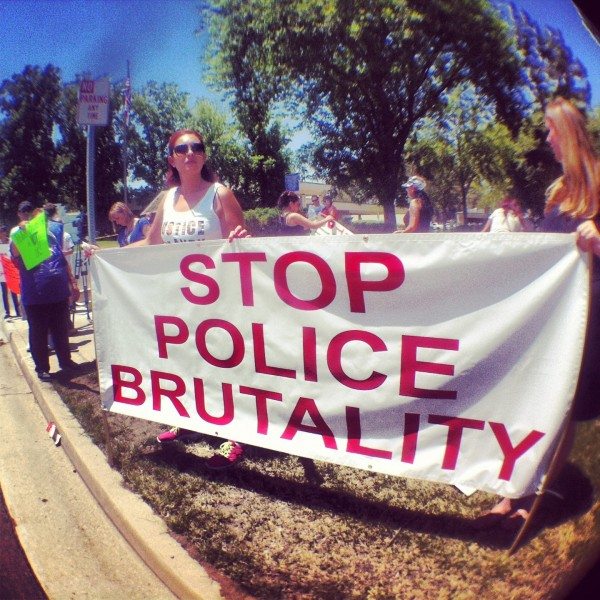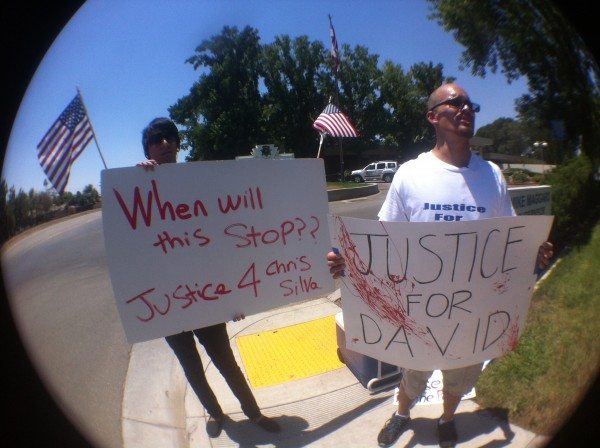Last year, LatinoRebels.com ran a three-part series by local Bakersfield journalist/writer Nicholas Belardes about the in-custody death of David Sal Silva. This weekend’s news that no charges would be filed by the local district attorney led to the following epilogue by Nicholas. The previous posts in the series are linked here: “Part One: Culture of Drugs,” “Part Two: Culture of Violence” and “Part Three: Analysis Of A Protest.” (All photos in the following are credited to Nicholas Belardes.)
Epilogue: Protesting David Sal Silva’s Beating Death
I was at the hospital again, this time for an x-ray of my left foot for an appointment I would never keep. I waited three months. I was in Texas writing by the time I was notified. There were other appointments at the same hospital. The cancer doctor who said I didn’t have cancer. The bloodwork. The chest x-ray. I left each appointment just as I came. Questions piled regarding the mysteries of my health. I’d told a doctor “you’re not listening.” Had given her a detailed timeline of my injury. The cancer doctor at Kern Medical Center said I needed to Google my answers.
This is the hospital in Bakersfield that turned David Sal Silva away when he sought help. Each time I showed up I slowed next to the corner of Palm and Flower streets. Each time I imagined David Sal Silva’s howls, his vomiting in the darkness, his blood still damp in the morning as if grass could bleed dew.
I blame Silva for the drugs he was on. I blame the hospital for turning him away. I blame officers, even their hungry, snarling attack dog, for working his heart into an explosive frenzy. I blame society for not caring. I blame what has been defended by law officials as the legality of his beating for de-humanizing all of us when it comes to the force officers can use when other solutions are apparent. I blame a lack of compassion, a lack of empathy in the media’s own opinion-makers.
I blame the contradictions regarding the word, drugs. We live in a drug-crazed society, both intolerant and in denial. I wonder why so many love Matthew McConaughey as the heroic drugged-up detective Rust Cohle in True Detective, but could hate Silva, a man like Cohle who was looking to be reborn through the fires of the down-and-out.
Often when drugs are connected with a death, the substance abuser is vilified. Any related cause-and-effect complexities are ignored. So I’m not surprised by Kern County District Attorney Lisa Green saying there would be no charges in the death of Silva, a man who was addicted, self-abused, outcast, alone, desperate, high, wanting help, wishing for a new life, then fell asleep, only to be awakened by an attack from officers and a K-9, all while tragically across the street from a hospital and drug treatment center.
I wasn’t surprised when a longtime journalist, one who admittedly is friends with the previous district attorney posted on my Facebook, “Without Silva’s drug intoxication, he might have compiled willingly or certainly after the first dog bite. But his reactions set everything else in motion. It sounds nice to have deputies try to use their weight to subdue him, but in the face of a thrashing violent big man, that doesn’t support officer safety. So the officers applied force in a legal way.”
It doesn’t surprise me the local sheriff would blurt words out like some militaristic automaton stuck on repeat, “The facts are the facts. I knew the facts and I knew the result would be the same because you can’t change the facts.”
It doesn’t surprise me the same newspaper would only offer the point of view of the officers in its re-telling of details, presenting a highly illogical connecting-of-the-dots between Silva’s death and his drugged state of mind, instead of looking into the highly complex cause and effects of his fatal night that also includes a culture of police violence.
“Silva refused to comply,” the newspaper said.
Where this media language is vague is it doesn’t take into account how the officer could assume Silva was in his right mind to comply (the article also stated the officer suspected drugs prior to attacking Silva). At what point, for example, is a mental patient expected to comply or not comply? How is it that violent mental patients in hospitals are restrained without strikes and blows? How was it even possible to make such a judgment against Silva that he should be attacked for standing up? Sounds like a medical issue that could have been addressed across the street at the hospital.
“I hate the system here,” an emergency room doctor at the same hospital once confided in me.
This is an American tragedy being repeated, one where families of addicts (along with the rest of us) need to ponder this fine line between the legality of reasonable and excessive force, and then protest.
I’ve thought many times while passing Silva’s stop-sign memorial: this is Bakersfield’s Fruitvale Station. I imagine writing a story similar to the tragedy of Oscar Grant, a man who was trying to better his life, who found himself struggling in cuffs, who was shot in the back in cold blood on a BART platform.
Silva was trying.
I wonder about writing such a film and its resulting impact were such a movie to be made.
Silva was exiled from a health facility before being beaten and bit to death under a grey blanket of legalities. In his death I see the dispassionate, the robotic coldness in men and women: the D.A., law officials, the media people who love their relationships with law organizations (and so rarely criticize them) who like too many in society seem to be coldly unaware of the humanity in others, making excuses in the name of legality like so many Southern politicians and officials once said while supporting lynch-laws.
I told that journalist he lacked compassion. He can’t see that every baton strike, every dog bite, every crush and scrape was another string of rope for Silva.
***









[…] Epilogue (2014) […]